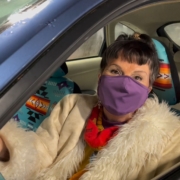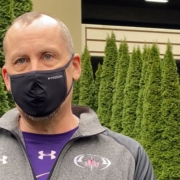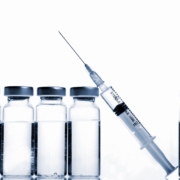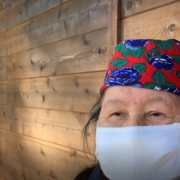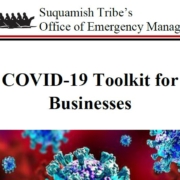Tribe welcomes New Year with COVID-19 Vaccinations
As the sun sets on 2020, the Suquamish Tribe begins COVID-19 vaccinations.
A small group of healthcare providers and support staff received their first doses this week. That sets the stage for mass vaccinations, starting with Tribal Elders, beginning on Monday, Jan. 4.
In this New Year’s Eve video, Interim Suquamish Tribe Co-Directors Scott Crowell and Jamie Gooby provide details on how vaccinations for the Tribe will unfold in the coming days and weeks as the Tribe looks forward to 2021.
Suquamish Tribe 2020 COVID-19 Testing Site: Holiday Closure Schedule
The Tribal Government offices, and therefore the Tribal Covid-19 testing site, will be closed Dec. 18 – Jan. 3, 2020.
We will resume testing on:
Monday, Jan. 4, 2021 from 8:30 am to 12:00 pm
The following list includes other testing sites that can be used. We have called and verified the information, however, we recommend you call first. Be sure you take your insurance cards.
Immediate Clinic Poulsbo
(360) 779-7011
COVID-19 testing center
Appointment required- schedule appointment online
Referral not required
Testing for all patients
Hours: 8am-8pm
Franciscan Medical Clinic- Bainbridge Island
COVID-19 testing center
Appointment required- call (206) 201-0488 to schedule
Referral not required
Testing for all patients
Hours:
M-F: 7am-6:30pm, Sa-Sun: 8am-4:30pm
Closed on Thanksgiving, Christmas Day, and New Year’s Day.
Open until noon Christmas Eve
Open until 5pm New Year’s Eve
The Doctors Clinic Ridgetop East
(360) 782-3400
COVID-19 testing center
Appointment not required
Referral not required
Testing people with COVID symptoms or recent/probable exposure
Hours:
M-F: 9am-7pm, Sa-Sun: 9am-5pm
Closed Christmas
Harrison Belfair Urgent Care
(360) 277-2975
COVID-19 testing center
Appointment not required
Referral not required
Testing for all patients
Hours:
M-F: 7:30am-7:30pm, Sa-Sun 7:30am-7:30pm
Christmas: 9am-4pm
Kitsap County Community COVID testing sites:
Appointment required for Kitsap County community COVID testing. Register online here or by phone at (360) 728-2235.
Kitsap County Fairgrounds
1336 NW Fairgrounds Rd
Bremerton, WA
Center the grands by Gordon Field
Monday to Thursday 10am -3pm
360-728-2235
Kitsap Conference Center
Bremerton Harborside Parking Garage level 2 green
100 Washington Ave
Bremerton
Tuesday only 10am to 3pm
360-758-2235
Poulsbo City Hall
200 Moe Street NE
Poulsbo
Friday only 9am to 2:30
360-728-2235
Suquamish Government Picks Moderna Vaccine for Distribution to Tribal Community
Tribe Now Entering Critical Period to Prevent Spread of Disease
The Suquamish Tribal Council, following the recommendation of the Tribe’s Public Health Officer, Dr. Barbara Hoffman, has decided to provide the Moderna COVID-19 vaccine to Tribal membership and staff as it becomes available.
The Moderna vaccine is expected to gain approval for emergency use from the Food and Drug Administration this week. While it remains unclear how quickly mass vaccinations will begin, Tribal officials expect the first small batches of doses to begin arriving shortly after the New Year with additional supplies increasing over the following weeks.
Tribal officials have prioritized vaccinations to Elders and those most at-risk from COVID-19, as well as continuity of government to ensure leaders and critical staff are able to keep distribution moving.
“We’re starting to see the light at the end of the tunnel, but that tunnel is still pretty long,” says EOC Manager Cherrie May. “It will still be several months before we can get everyone vaccinated.”
That’s why it is so important for everyone to continue staying focused on preventing the spread of the virus.
“Wear your masks, keep your distances, and please – please – don’t gather outside your immediate households. I know that will be hard during the holidays, but it is so important. We really can pull together right now, by staying apart.”
Kitsap County and the Suquamish Tribe, like much of the country, is seeing a surge in positive cases. The spike is largely attributed to extended families and friends gathering together for Thanksgiving.
“Let’s not make that same mistake here over Christmas and New Year’s,” says May. “The risk is too big. The consequences are too severe. The lives of our loved ones are at stake.”
Picking Moderna
Meanwhile, Tribal staff are hard at work preparing for vaccine distribution.
The Tribal Council had the choice of two vaccines — one offered by Pifzer and the other by Moderna.
“In close consultation with our medical experts, we determined the Moderna vaccine provided the best option for our community,” says Hoffman.
The vaccines are more similar than they are different, with the exception of how they are stored
The Moderna vaccine is about 95 percent effective. It requires two doses, about a month apart, to achieve that high level of effectiveness. This is a new type of vaccine that helps people create virus-fighting antibodies without actually infecting them with COVID-19.
And, finally, some people will feel the same short-term, flu-like side effects from either vaccine. Health experts at FDA and CDC stress that most side effects are a sign that the vaccine is working as intended.
Unlike the Pfizer vaccine, which has more demanding frozen storage and distribution protocols, Moderna’s vaccine can be stored four degrees below zero, which is a standard freezer temperature. After it’s thawed, it can be administered for up to 30 days.
“The logistics of providing the vaccine to the entire Tribal community will be unprecedented for us,” says May. “A lot of work is going into planning and preparing for that, so getting the increased flexibility that Moderna gives us is huge.”
Side effects are a good sign
They may not feel like it at the time, but most side effects from the vaccine are a good thing, say health experts.
“They show the body is doing exactly what it’s supposed to be doing,” says Suquamish Tribe’s Public Health Officer Dr. Barbara Hoffman. “It shows that your immune system is working by creating the antibodies you need to fight off the disease.”
Potential side effects include pain or swelling at the injection site, muscle and joint aches, fever, nausea, and headache.
“The most common side effects noted in vaccine trials were pain and swelling at the injection site,” says Hoffman. “For most study participants, side effects were mild to moderate and subsided within one to three days.
But don’t worry if you don’t feel those side effects, she says. “It’s still working. The vast majority of those who get both doses – and it’s really important everyone gets both doses – will be protected.”
Pull Together
A message from Suquamish Tribal Elders on the importance of pulling together during this most dangerous hour of the pandemic by doing everything we can to stay safely apart.
Suquamish Tribe Prepares Groundwork for Vaccine Distribution
Phased approach puts priority on most vulnerable
A Suquamish Tribe team headed up by Emergency Operations Manager Cherrie May is hard at work preparing for an unprecedented effort to vaccinate everyone in the Tribe who wants to be protected from COVID-19.
While there are still many unknowns, the Suquamish Tribe’s Vaccine Planning Committee drafted a vaccine distribution approach that was approved by the Tribal Council at their Nov. 23 meeting.
“The goal is to have a general approach in place so that when the vaccine arrives we are ready to hit the ground running as fast, efficiently, and safely as possible,” said May. “We’ve developed a phased approach that puts the priority on our most vulnerable Tribal members while keeping the government functioning so we can get the vaccine out to everyone else.”
The Vaccination Planning Committee includes May, the Suquamish Tribe’s Acting Co-Executive Director Jamie Goobie, Tribal Public Health Officer Dr. Barbara Hoffman, Tribal Attorney Melody Allen, Suquamish Chief Police Mike Lasnier, Early Learning Center Nurse Renee Hommel, and Communications Coordinator Jon Anderson.
“The Committee is working with a lot of uncertainty tied to the vaccines, but we have been doing our best to think through a variety of intertwining issues,” says May.
Among the questions, unknowns, and issues the Tribe is grappling with:
- Which of the two leading vaccines the Tribe will decide to provide.
- How many doses of the vaccine will the Tribe get initially and in follow-up batches.
- The logistics of receiving, storing, and administering two doses of a vaccine to thousands of Tribal members, families, and employees.
The Pfizer vaccine, for example, is expected to be the first released for use, but is shipped only in large batches of doses and it must be stored at -80 degrees. Once thawed it must be kept cold and administered within six hours. It also will require two doses to be effective
“Whether the Tribe will be able to access to this vaccine and be able to administer it has not been ruled out yet as we are stilling waiting on some answers from the Department of Health to some of these very questions,” says Hoffman, who was appointed as Tribal Health Officer by Tribal Council last month.
The Moderna vaccine is next in line for potential distribution and will likely begin to be available starting in January.
This vaccine also requires two shots but is easier to store and provides more time to administer once thawed, says Hoffman.
“Regardless of which vaccine the Tribe first receives, we do not expect to get a large number of doses in the first batch. We also don’t know how many doses will be provided over time for mass vaccination,” says Hoffman.
Given all the unknowns, vaccine distribution will happen in phases, and Suquamish health officials will need flexibility to accommodate the uncertainties, she says.
“The approach is based on two key priorities – continuity of government and health vulnerability of Tribal members,” says Hoffman.
The first group, which is likely to be a small group, includes individuals needed to make sure the Tribal government can continue to operate – Tribal Council, for example – and high-risk essential employees who are in constant, direct contact with members of the community, particularly those who are especially vulnerable.
“So that would include nurses, in-home care providers for Elders, community health representatives, case managers and others in the direct line of fire who have been who are at high risk of exposure to the virus every day,” says Tribal Attorney Allen. “These are people who provide care to our most vulnerable.”
The next group includes all Tribal elders, as well as moderate-risk, but essential workers.
That group will be immediately followed by all remaining Tribal members and member households.
The last group to receive vaccinations will be remaining Tribal Government staff and Tribal Enterprise workers.
“We are still working out the logistics while not knowing when and how many doses the Tribe will receive,” said May. ”As we’ve been doing all along, we are planning with flexibility to avoid any logistical and/or medical problems and so we are ready to hit the ground running as soon as the vaccine is released.”
Tribal leaders urge anyone with questions or concerns to email Covid_Questions@suquamish.nsn.us
As the situation develops and more details become available, Tribal members will be notified via the Tribe’s website and Suquamish Updates Now (SUN). If you haven’t signed up yet, or need to update your information, you can do that here.
Give Thanks, Not COVID
Suquamish Tribe Begins Preplanning COVID-19 Vaccine Distribution
A newly formed preplanning group from the Suquamish Tribe’s Emergency Operations Center gathered online this week to begin early preparations for vaccination distribution to Tribal members and staff in the coming months.
Dubbed the COVID-19 Vaccine Planning Subcommittee, the task group consists of Suquamish Tribe Acting Co-Director Jamie Gooby, EOC Manager Cherrie May, Community Health Nurse Barbara Hoffman, Tribal Attorney Melody Allen, Marion Forsman-Boushie Early Learning Center School Nurse Renee Hommel, EOC Public Information Officer Jon Anderson, and Emergency Management Consultant Eric Quitslund.
The first meeting of the planning group focused on reviewing the Tribe’s Pandemic Response Plan, getting an overview of medical countermeasures, and beginning the work of assessing vaccination priority groups.
“At this point, there are still a lot of unknowns in terms when the first vaccine will be approved, when – and in what quantities – it will be available, and how it will need to be controlled and administered,” said May. “So, this first meeting was really centered on what kind of questions we need to be asking and what potential scenarios we need to be thinking through.”
Also of paramount concern is vaccine safety.
“We will be listening to and consulting with the medical and scientific experts we know and trust,” said Gooby. “That will play a big role in which vaccine Tribal Council ultimately opts to make available and when Tribal government decides to deploy it.”
Currently, there are 11 vaccines now in the final “Phase 3” level of testing, including four underway in the United States. Phase 3 testing for each potential vaccine involves some 30,000 volunteers, who take either the candidate vaccine or a placebo, across dozens of sites around the country.
Vaccines work by training your body’s natural defenses to recognize and fight off viruses. “If the body is exposed to those disease-causing germs later, the body is immediately ready to destroy them, preventing illness,” according to the World Health Organization.
New rules from the Food and Drug Administration issued on Oct. 6, suggest the earliest the first COVID-19 vaccine might be approved for emergency use is mid to late November, with large-scale availability ramping up over several months after approval.
Suquamish Tribe’s Toolkit for Businesses
In response to the Suquamish Tribal Council’s facial covering policy (Resolution # 2020-104) and overall COVID–19 response, the Suquamish Tribe’s Emergency Operations Center would like to assist our Port Madison Indian Reservation businesses during this global public health emergency.
The COVID-19 pandemic has impacted the social and economic vitality of our local community. But we can lessen these impacts and recover from this public health pandemic when business owners like yourself take steps to reduce your risk and take steps now to recover. Working collaboratively with employees, the public, and local government, businesses can help strengthen both public health and community response in a manner that protects us all.
To support this effort, the Suquamish Tribe’s Office of Emergency Management has compiled this tool kit of resources with links to useful tools that are drawn from the following authoritative sources:
Suquamish Tribal Government
Face masks now required in public spaces on Reservation
Downloadable PDF of this tool kit
Kitsap Health District
The Role of Employers in Effective Contact Tracing
Kitsap County COVID-19 Risk Assessment Dashboard
Kitsap County
Kitsap County Pathway to Recovery Playbook
Washington State Department of Health
Business Information for Administrators and Employees
Food Workers and Establishments Guidance on COVID-19
Guidance for Daily COVID-19 Screening of Staff and Visitors
Checklist for Businesses with Suspected or Confirmed Cases of COVID-19
Guidelines for Grocery and Food Stores
Food Pantries Phase 2 Guidelines
Food Worker Employee Health & Decision Strategies
Safe Cleaning and Disinfection Guidance for Public Space
Posters
Be a Germ Buster. . .Wash Your Hands
COVID-19 – General Information
Washington State Coronavirus Response
Safe Start: Business Guidance, County Status and What’s Open
Overview of COVID-19 Statewide Face Covering Requirements
Department of Labor Guidance on Preparing Workplaces for COVID-19
Posters
“What does six feet look like?”
Help keep Grocery store staff and customers safe
Workplace Safety
COVID-19 Phases 1 and 2 Workplace Safety and Health Requirements
Centers for Disease Control and Prevention (CDC)
Considerations for Restaurants and Bars
Planning Guides & Checklists
Get Your Workplace Ready for Pandemic Flu
Get Your Mass Gatherings Ready for Pandemic Flu
Pandemic Flu Checklist: Workplace Administrators
Pandemic Flu Checklist: Event Planners
Posters
Don’t Spread Germs at Work (Employers)
Stay Home if You’re Sick (Employers)
Federal Emergency Management Agency (FEMA)
COVID-19 Best Practice Information: Economic Recovery
FEMA Recovery & Economic Support
Public Assistance Disaster-Specific Guidance – COVID-19 Declarations

